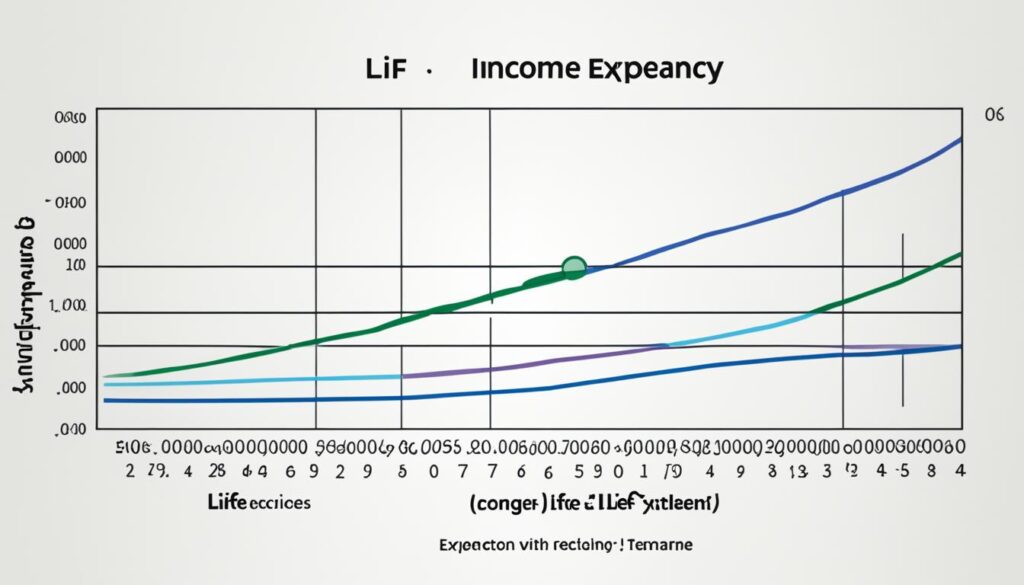People now live longer lives. Planning for this has become key to financial safety in retirement. Yet, only 1 in 10 U.S. adults really understand how long they might live after 65. They’re unsure about reaching 90 or passing away before 70.
It’s very important to guess how long you might live when planning for retirement. This is because nowadays folks need their savings to last longer. Many make the mistake of thinking they’ll live shorter lives. This can mean not saving enough for retirement.
But it’s not just personal planning that’s off. Governments and big groups also struggle when figuring out how to pay for retirement and welfare programs. And if people live 3 years longer by 2050, it’ll cost a lot more to care for the elderly. This could rise by 50%.
To fix these problems, we need to think ahead about long-term care. We should all work on plans that consider the impact longer lives have on our money. This way, both people and big groups can aim for better and safer retirements.
Key Takeaways
- Only 1 in 10 U.S. adults truly gets how long they might live.
- Guessing wrong about life span could mean not having enough money for retirement.
- It’s hard for both individuals and big groups to plan for longer life spans.
- If people live 3 years longer by 2050, caring for the elderly could cost 50% more.
- Thinking about long-term care and making solid plans is vital for a safe and comfy retirement.
Understanding Longevity Risk
Longevity risk is important in planning for retirement and staying secure in later life. It talks about the difference between how long we expect to live and how long we live. Historically, predictions on our lifespan have fallen short, catching many people unprepared for long retirement years.

Life expectancy and longevity risk consider several key factors. These include age, gender, if you smoke, and health history. Generally, women live longer while non-smokers have a longer life. A family history of living long or not having chronic health problems can also extend your life.
Defining Longevity Risk
Longevity risk is the danger of running out of money in retirement because we live longer. Advanced healthcare and better living conditions have increased our life spans. But, it’s hard to know exactly how long we’ll live, which causes financial stress in old age.
People often don’t fully realize the risk of outliving their money. This can lead to not saving enough for retirement or not having the right insurance. Both situations can cause money problems later in life.
Factors Influencing Life Expectancy
Several things dictate how long a person might live:
- Age: Surviving your younger years means you might live longer.
- Gender: Women generally live longer than men, though this gap is reducing.
- Smoking status: Not smoking can boost your life expectancy by a lot.
- Health history: Illnesses like diabetes and heart disease can lessen how long you live.
Aside from personal factors, better medical treatments and health services are also important. They are helping us stay healthier for longer. This keeps raising the average life expectancy, highlighting the need to plan for more retirement years.
Being proactive about health and realistic about how long we might live is key to managing retirement finances. By anticipating healthcare costs and making informed lifestyle choices, individuals can better prepare for the financial challenges that often come with aging. This proactive approach not only helps in budgeting but also enhances the quality of life during retirement. Ultimately, understanding these dynamics is essential for navigating retirement transitions effectively, ensuring a smoother and more secure financial journey in the golden years.
| Factor | Impact on Life Expectancy |
|---|---|
| Age | Higher age correlates with higher life expectancy |
| Gender | Women have a higher life expectancy than men |
| Smoking Status | Non-smokers have a higher life expectancy than smokers |
| Health History | Absence of chronic diseases increases life expectancy |
Common Mistakes in Estimating Life Expectancy
Many make mistakes when planning for retirement. They overlook key points about life expectancy. This can mess up how they manage their money and estates. Let’s look at some popular errors people make about how long they’ll live.
Relying on Family History
One big mistake is only looking at family history to guess how long you’ll live. Sure, genes matter. But modern healthcare and healthier living mean we live longer now. If you only look at what parents or grandparents did, you might think you’ll live shorter. This could make you plan poorly for enough retirement money.

Ignoring Gender and Health Differences
Not factoring in gender and health is another mistake. Research tells us women usually live longer. Your health, like if you smoke or have health issues, also plays a big role. Forgetting about these can mess up retirement plans, since your guess might be off.
| Group | Percentage Underestimating Life Expectancy |
|---|---|
| Pre-retiree Men | 67% |
| Pre-retiree Women | 50% |
The table here shows lots of people nearing retirement – especially men – think they’ll live fewer years past 65. This mistake can mean not saving enough for later in life, causing money worries.
Underestimating Retirement Duration
Others don’t realize how long their retirement might last. On average, folks stop working three years earlier than they thought they would. This shows the gap between what we’re confident in before retiring and what really happens. So, we should plan for a longer retirement than we imagine.
“Failing to plan for a longer retirement can have serious consequences for financial security and quality of life in later years. It’s essential to consider the possibility of an extended retirement when making wealth management and estate planning decisions.”
It’s key to avoid these errors to make solid retirement plans. A smart plan looks at your health, your gender, and prepare for more years in retirement. This way, you can really enjoy your later years without money worries.
The Financial Implications of Longevity
People are living longer, so planning for retirement is more crucial. By 2050, the average person will live 3 years longer. The cost of getting older will jump by 50% as a result. This makes solid retirement planning and financial security key tasks.
Deciding when to get Social Security is a big deal. Most folks don’t wait until 70, which means they get less money each month. But starting benefits at 62 means you get less over time. Waiting can mean an extra $182,000 in your pocket.

The choice to start Social Security early has many reasons. Some need the money right away. Others don’t realize how long their money needs to last. It shows how important careful planning is for everyone.
Longer lives also impact estate and insurance plans. With more years, ensuring your wealth goes where you want is vital. Life insurance helps take care of family after you’re gone, more important than ever.
So, preparing for a longer life takes work. We need to study our own life expectancy. Then, tailor our plans to fit. Good choices and saving smart can make our later years secure and worry-free.
Longevity Planning: Strategies for Success
It’s key to plan for a long life in a detailed way. Think about your money’s health. Know how much risk you can take with living long. Get a good idea of how long you might live. Then, make changes to your retirement plans. This will make your future more certain. It also helps you leave something behind for others.
Assessing Your Longevity Risk Tolerance
How ready are you for a long life? This is as important as knowing how you feel about risks in your money. Do you plan for retirement, health care, and what happens after you’re gone well?
Knowing your risk for living a long time helps a lot. This lets you choose better retirement and estate plans.
Obtaining Personalized Longevity Estimates
Don’t rely only on family history or general numbers for how long you might live. Get an estimate just for you.
These estimates look at things like your age, if you smoke, and health history. They give you a better idea of how long you might live. Using something like the Longevity Illustrator can help you plan your money better.
Adjusting Retirement Plans Accordingly
Now, change your retirement plans based on what you know.
- Think hard about how long you might live and what this means for your money goals.
- Get a personal estimate to help with retirement planning.
- Make your savings better and think about pensions and social security. Also, plan for taxes smartly. Get ready for any problems by having plans ready.
By following these steps, you can handle the risk of living a long time. This includes planning for if you die early, made the wrong guess about how long you’d live, or run out of money. Good planning never stops. It needs you to be flexible and think ahead.
Tools and Resources for Longevity Planning
For planning your long life, it’s key to have the right tools and info. This helps with smart choices for your retirement and money plans. Luckily, many great resources are here to guide people and finance experts through the steps.
The Longevity Illustrator stands out as a top tool. It’s made by the American Academy of Actuaries and the Society of Actuaries. This online tool gives personal estimates on how long you might live. It looks at things like your age, gender, if you smoke, and health history. This info helps you see how long you might live, and the chances of living to a certain age. That makes it more useful than simpler tools that don’t consider all these details.
Longevity Illustrator
Here’s why the Longevity Illustrator is great for knowing about retirement and money planning:
- It figures out your life expectancy based on who you are
- It shows the chances of hitting different age milestones
- You can put in your own details for a better look at your situation
- The site is easy to use, making it simple to see your results
This tool can help both individuals and finance pros in making better choices. It’s about retirement, managing money, and care plans.
Retirement Confidence Surveys
The Retirement Confidence Survey by the EBRI is also a big help. It looks at what American workers and retirees think and face in retirement. Recent surveys found some key points:
- Many end up retiring earlier than they planned, often due to surprises
- People sometimes feel more ready for retirement than they really are
- Health and long-term care costs worry a lot of retirees
- How people get retirement money and plan for it changes by group
Studying these survey results helps finance pros understand the hurdles and chances in planning for a long life. They can use this to make better plans with their clients. This aims to make sure retirees are secure and meet their financial dreams.
With tools like the Longevity Illustrator and data from surveys, people and experts can tackle long life planning better. The key is using all the info available to make smart decisions. This approach helps in dealing with the challenges of planning for a long retirement in today’s world.
Conclusion
Many make the mistake of not thinking they will live long. This can really affect how safe your money is when you retire. People often just look at their family’s history or forget that not everyone lives as long. In the end, they might plan too little for their retirement or plan it badly.
For a good longevity plan, it’s important to know how much risk you’re okay with. Get a guess on how long you’ll live that’s just for you. Then, change your retirement plans to fit these new ideas. There are tools like the Longevity Illustrator and people’s thoughts from surveys that can really help you here.
To have a successful retirement, and maybe even leave something behind, you need to plan for a long life. Think about needing care as you get older and how your things will be handled when you’re gone. Besides money for when you stop working, make sure to think about these other things. A good, solid plan for getting older will help you be more ready and safer with your money in your later years.

